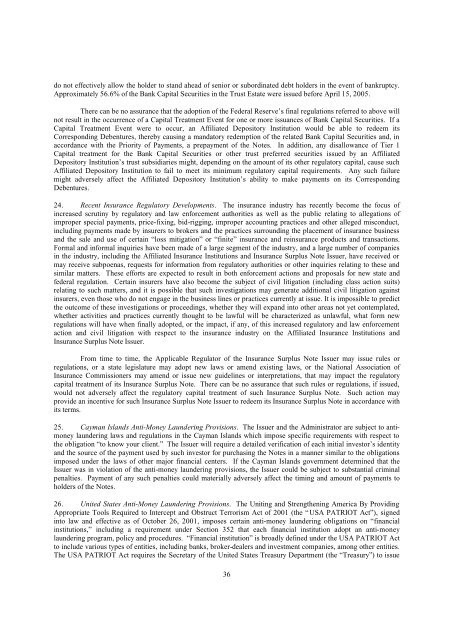MMCapS XVII Final Offering Circular - Irish Stock Exchange
MMCapS XVII Final Offering Circular - Irish Stock Exchange
MMCapS XVII Final Offering Circular - Irish Stock Exchange
Create successful ePaper yourself
Turn your PDF publications into a flip-book with our unique Google optimized e-Paper software.
do not effectively allow the holder to stand ahead of senior or subordinated debt holders in the event of bankruptcy.<br />
Approximately 56.6% of the Bank Capital Securities in the Trust Estate were issued before April 15, 2005.<br />
There can be no assurance that the adoption of the Federal Reserve’s final regulations referred to above will<br />
not result in the occurrence of a Capital Treatment Event for one or more issuances of Bank Capital Securities. If a<br />
Capital Treatment Event were to occur, an Affiliated Depository Institution would be able to redeem its<br />
Corresponding Debentures, thereby causing a mandatory redemption of the related Bank Capital Securities and, in<br />
accordance with the Priority of Payments, a prepayment of the Notes. In addition, any disallowance of Tier 1<br />
Capital treatment for the Bank Capital Securities or other trust preferred securities issued by an Affiliated<br />
Depository Institution’s trust subsidiaries might, depending on the amount of its other regulatory capital, cause such<br />
Affiliated Depository Institution to fail to meet its minimum regulatory capital requirements. Any such failure<br />
might adversely affect the Affiliated Depository Institution’s ability to make payments on its Corresponding<br />
Debentures.<br />
24. Recent Insurance Regulatory Developments. The insurance industry has recently become the focus of<br />
increased scrutiny by regulatory and law enforcement authorities as well as the public relating to allegations of<br />
improper special payments, price-fixing, bid-rigging, improper accounting practices and other alleged misconduct,<br />
including payments made by insurers to brokers and the practices surrounding the placement of insurance business<br />
and the sale and use of certain “loss mitigation” or “finite” insurance and reinsurance products and transactions.<br />
Formal and informal inquiries have been made of a large segment of the industry, and a large number of companies<br />
in the industry, including the Affiliated Insurance Institutions and Insurance Surplus Note Issuer, have received or<br />
may receive subpoenas, requests for information from regulatory authorities or other inquiries relating to these and<br />
similar matters. These efforts are expected to result in both enforcement actions and proposals for new state and<br />
federal regulation. Certain insurers have also become the subject of civil litigation (including class action suits)<br />
relating to such matters, and it is possible that such investigations may generate additional civil litigation against<br />
insurers, even those who do not engage in the business lines or practices currently at issue. It is impossible to predict<br />
the outcome of these investigations or proceedings, whether they will expand into other areas not yet contemplated,<br />
whether activities and practices currently thought to be lawful will be characterized as unlawful, what form new<br />
regulations will have when finally adopted, or the impact, if any, of this increased regulatory and law enforcement<br />
action and civil litigation with respect to the insurance industry on the Affiliated Insurance Institutions and<br />
Insurance Surplus Note Issuer.<br />
From time to time, the Applicable Regulator of the Insurance Surplus Note Issuer may issue rules or<br />
regulations, or a state legislature may adopt new laws or amend existing laws, or the National Association of<br />
Insurance Commissioners may amend or issue new guidelines or interpretations, that may impact the regulatory<br />
capital treatment of its Insurance Surplus Note. There can be no assurance that such rules or regulations, if issued,<br />
would not adversely affect the regulatory capital treatment of such Insurance Surplus Note. Such action may<br />
provide an incentive for such Insurance Surplus Note Issuer to redeem its Insurance Surplus Note in accordance with<br />
its terms.<br />
25. Cayman Islands Anti-Money Laundering Provisions. The Issuer and the Administrator are subject to antimoney<br />
laundering laws and regulations in the Cayman Islands which impose specific requirements with respect to<br />
the obligation “to know your client.” The Issuer will require a detailed verification of each initial investor’s identity<br />
and the source of the payment used by such investor for purchasing the Notes in a manner similar to the obligations<br />
imposed under the laws of other major financial centers. If the Cayman Islands government determined that the<br />
Issuer was in violation of the anti-money laundering provisions, the Issuer could be subject to substantial criminal<br />
penalties. Payment of any such penalties could materially adversely affect the timing and amount of payments to<br />
holders of the Notes.<br />
26. United States Anti-Money Laundering Provisions. The Uniting and Strengthening America By Providing<br />
Appropriate Tools Required to Intercept and Obstruct Terrorism Act of 2001 (the “USA PATRIOT Act”), signed<br />
into law and effective as of October 26, 2001, imposes certain anti-money laundering obligations on “financial<br />
institutions,” including a requirement under Section 352 that each financial institution adopt an anti-money<br />
laundering program, policy and procedures. “Financial institution” is broadly defined under the USA PATRIOT Act<br />
to include various types of entities, including banks, broker-dealers and investment companies, among other entities.<br />
The USA PATRIOT Act requires the Secretary of the United States Treasury Department (the “Treasury”) to issue<br />
36
















